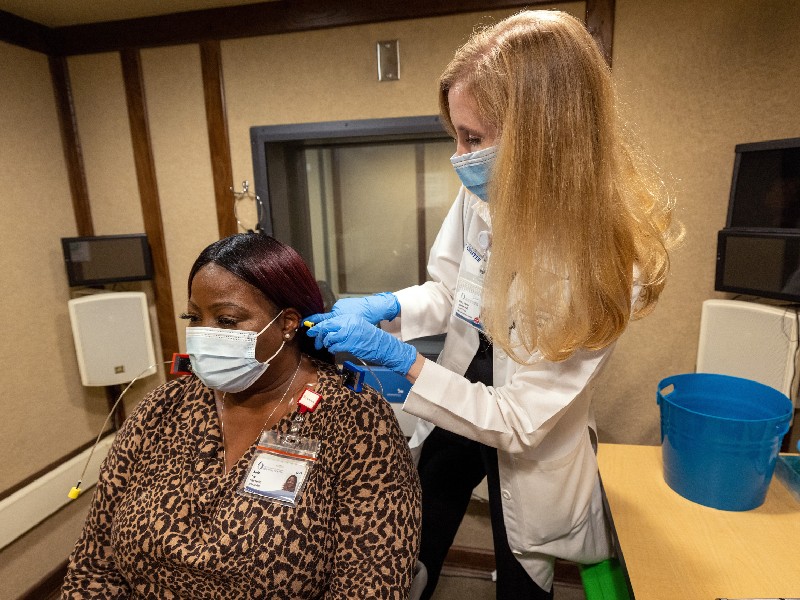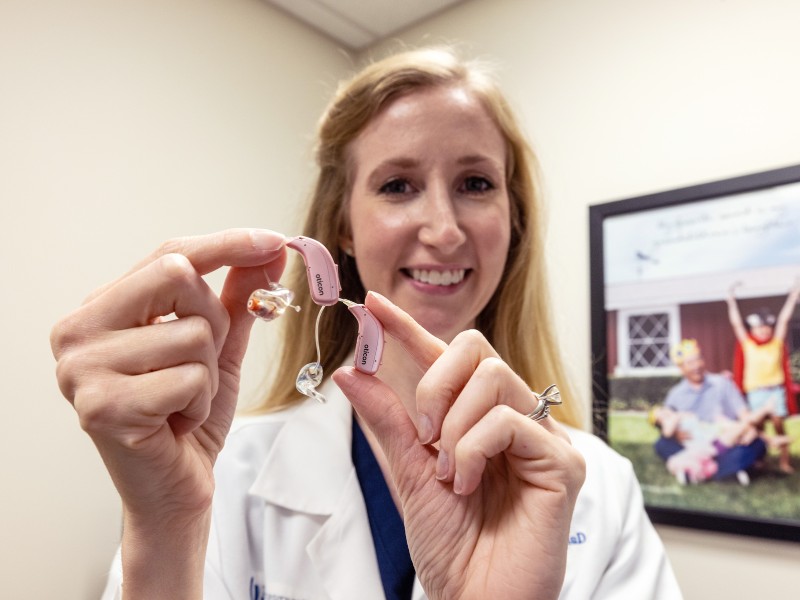When considering OTC hearing aids, be an informed consumer

When it comes to using a hearing aid, experts at the University of Mississippi Medical Center have a common goal: The device should provide the optimal benefit and be accessible to those in need.
But to get the most benefit – and the most bang for the buck on a hearing aid purchase – it’s important to know how much hearing you’ve lost. It’s a necessary consideration in light of the U.S. Food and Drug Administration’s action to make hearing aids available over the counter to those with mild to moderate hearing loss, with no prescription or trip to a provider required, as soon as October.

“Knowledge of your hearing loss is going to create the greatest outcome in improving your ability to hear,” said Dr. Victoria Gonzalez, UMMC associate professor and chief of the Division of Audiology. “We don’t want someone to purchase something that won’t be beneficial. We want it to be a positive experience.”
Traditionally, the high cost of hearing aids has discouraged millions of Americans from pursuing them. The devices are generally not covered by insurance or Medicare, and covered by Medicaid only in individuals under 21.
That leaves many people both untested and with uncorrected hearing loss that studies show can contribute to cognitive decline and depression in the older population.
Just because over-the-counter hearing aids don’t require a prescription doesn’t mean that people can’t get their hearing tested by a licensed audiologist before a purchase.

“We often see people who think they have a mild degree of impairment. Once we complete testing, we discover they have a more severe degree of hearing loss than they perceived,” said Dr. Mary Frances Johnson, an associate professor and director of clinic operations for the Division of Audiology. Audiology is part of the Department of Otolaryngology – Head and Neck Surgery.
“They might purchase something over the counter that can’t meet their hearing needs, and they invested that money for a device that isn’t appropriate for their hearing loss,” Johnson said. “That could create a negative experience: ‘I tried it, and it doesn’t work.’ We don’t want that to happen.”
Typically, people experiencing mild hearing loss are able to communicate with others in a quiet environment, but struggle when there’s significant background noise, Gonzalez said.
Those with moderate hearing loss might struggle to hear in a quiet environment, not to mention one that’s noisy. It’s important to distinguish that not everyone’s hearing struggle is the same from environment to environment, Gonzalez said.
“Hearing loss is not typically flat. It’s not the same across all the different pitches,” she said. “Some people have hearing loss that starts in the mild range, but then slopes into the moderate range.”
Those with severe hearing loss will struggle in all environments, Gonzalez said. “They will have challenges just understanding, even in one-on-one conversations. It’s especially exacerbated if there is a loss of visual cues,” she said.
Audiologists and other medical practitioners aren’t against over-the-counter hearing aids, Gonzalez and Johnson say. They do, however, want consumers to arm themselves with information, ranging from what their true hearing loss is to the cost of an OTC device versus one purchased at a medical practice.
OTC hearing aid costs likely will vary widely. Much remains unknown on what models and what brands will be available at what price.

“One of the original ideas with OTC hearing aids was to give people more options,” Johnson said. “But there is some misunderstanding about price points. If you purchase something for $300, you can expect it to work at a more basic level. There are dozens and dozens of options, so that’s why I encourage patients asking about it to do their research.”
In the clinic of Johnson and Gonzalez, housed in the Medical Center’s Department of Otolaryngology - Head and Neck Surgery, prescription hearing aids range from $1,100 to $5,200 per pair, with UMMC employees with state health insurance receiving a discount.
“We don’t know if OTC hearing aids will include a warranty. Prescription hearing aids do include a warranty of one to three years and a return policy,” Johnson said. “So, that’s a little peace of mind on a prescription hearing aid.”
People who purchase OTC hearing aids might have trouble understanding the features and technology. “We can show them how to use it. We still offer services to optimize its use,” Gonzalez said.
“If you purchase a hearing aid at a store, there’s no professional to adjust it for you. They are considered self-fitting,” Johnson said. “You can sometimes use an app on your phone, but it could lead to someone over-amplifying or under-amplifying for hearing loss.”
Audiologists at UMMC perform thousands of hearing tests, a procedure that’s quick and not invasive, and generally covered by insurance. “We put them in a sound booth where we test the lowest sound that they can hear,” Gonzalez said. “We’re able to provide them with information on where they have challenges, and we can provide recommendations for OTC hearing aids or assisted hearing devices.”
Hearing health is critical for Keela Foy, an employee in Otolaryngology – Head and Neck surgery and a patient in the Division of Audiology. For several years, she has coped with vertigo that is accompanied by hearing loss in her left ear.
“I was in denial that I was losing my hearing, but when I got tested, I was losing hearing,” said Foy, the department’s surgery coordinator. “Every time I would have the onset of vertigo, I would lose my hearing.”
Between episodes of vertigo, she said, her hearing returned. “Then it will come out of nowhere, and I can’t hear to use the phone,” Foy said. “The last episode was in July, and the hearing just never came back. I asked Dr. Gonzalez if a hearing aid was the route I need to go.”
Consumers should consider their specific symptoms when they seek help for hearing loss, Johnson and Gonzalez say.
“When the audiologist is removed from the diagnostic process, ear conditions that require medical attention can be missed,” Johnson said. “If a difference in hearing between ears is obvious, or you have symptoms like pain or drainage from an ear, see a physician or audiologist before proceeding with an OTC purchase.”


